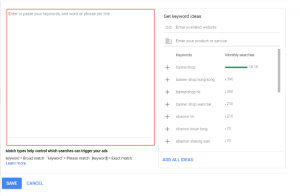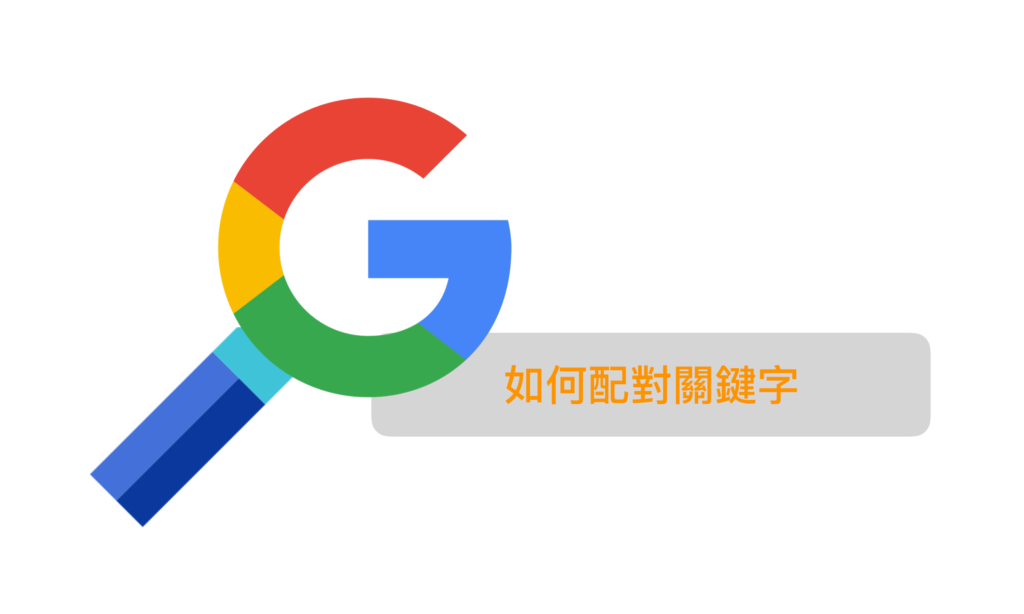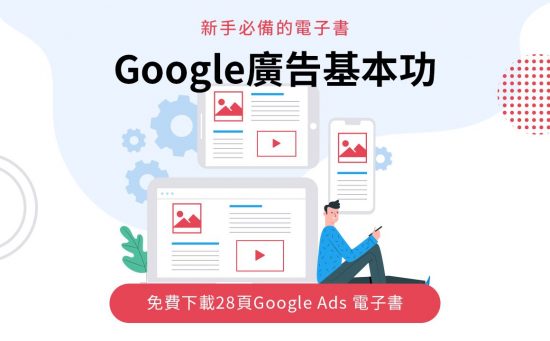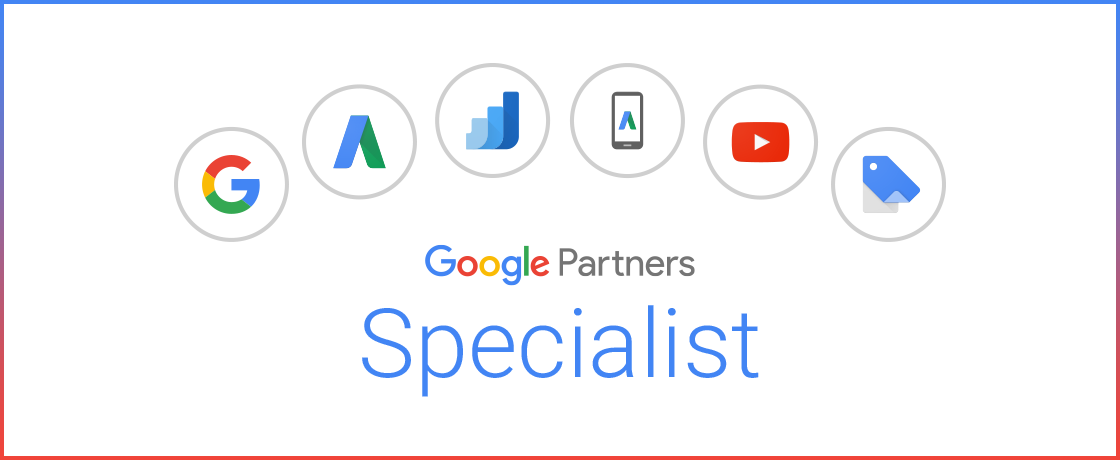Usually, after the general Google Ads novice completes the keyword collection Keyword Research, all the words will be put into the account directly, and most of the settings will be set to the default state, and finally the keyword performance is very poor. Or there are many low quality clicks.

To improve the performance of Google Ads, you can have different methods, such as the keyword sorting phase mentioned above, or the focus of this article – setting the Keyword Match Type.

The above picture is the interface for entering keywords. You can enter all the collected keywords into the red box. Many advertisers will directly input the keywords, but ignore the text below.
If the advertiser enters a keyword without ” ” or [ ] Google will set your keyword to Broad Match.
In fact, Keyword Match Type is mainly divided into 4 categories, which are:
Broad Match
Broad Match Modified
Phrase Match
Exact Match
This setting can limit the situation of your ad. In other words, it is to control Google’s freedom. I believe that at this moment, you do not quite understand the meaning of freedom. Next, I will introduce four different settings for different Match Type expressions and applications. I will use the “comb” keyword as an example.
Broad Match:
Broad Match is a Match Type setting that gives Google the most freedom in many Match Type settings. As long as the keywords you bid for are related to the keywords the customer is searching for, your ad will have an opportunity to appear in the search results page of the customer’s search results page, even if your keyword does not contain the keywords that the customer searches for, your Advertising also has the opportunity to appear in front of customers. Take “comb” as an example.
Expression: Comb (only enter keywords in the list, do not add any symbols)
Keywords that can cause advertising: chairs, combing, single combing, bed frames, curtains
Keywords that don’t cause ads: Apple, school bag, phone
Advantages: This setting covers a wide range of keywords and is very useful for expanding the keyword list Keyword Expansion. With Broad Match, you can find a lot of words you never thought of from the Search Term Report, you can also find some Unexpected search rules will help you expand your Acquisition channel .
Disadvantages: Since there are many related words that will trigger your ad, even if you don’t have a “curtain” product, customers may click on your ad because of this keyword, and waste some of your advertising expenses. These low quality Clicks have the opportunity to increase your advertising costs significantly , and your conversion rate has a chance to decline . Therefore, it should be carefully planned before using this setting.
Suggestion: If you need to use the Broad Match setting, you must use it together with the Negative Keywords. Negative Keywords can help you prevent some completely unrelated keyword clicks from taking up your expenses. This is a very useful setting for this degree of freedom. Limiting tool. GrowthSpot also recommends that newcomers with low initials in Google Ads or companies with low marketing budgets use other Match Type settings to accurately target your advertising budget. Experienced Google Ads staff or companies with sufficient funds can use Broad Match Search in both Keyword Research and Keyword Expandsion, which is a very powerful Research tool.
Broad Match Modified (BMM):
Broad Match Modified, literally, should be a modified version of Broad Match, but I think this setting is more like the Phrase Match. This setting gives Google the freedom between Broad Match and Phrase Match. This setting is generally used when an advertiser wants to bid for the Long Tail Keyword. Unlike Broad Match, when a customer searches for some longer keywords , the advertiser will appear on the results page only if the words contain keywords that the advertiser is bidding on. But even if the order of the words is different, they can trigger their ads. Examples are as follows:
Expression: + comb + single (plus + in front of the keyword)
Keywords that can cause advertising: single combing, single combing Hong Kong, single combing chair, single leather combing, combing single use
Keywords that don’t cause advertising: single seat combing, one person combing, single sofa
Advantages: Advertisers can use a combined BMM keyword instead of all potential combinations. For example, bidding + single + combing can cover all the words including “single person” and “comb”, reducing unnecessary unnecessary Time to enter different combinations. Moreover, compared to Broad Match, the quality of clicks will be relatively high, making it easier to increase the conversion rate. It is a very convenient setting.
Disadvantages: This setting does not contain all the words related to your product. If the customer searches for “single sofa”, your advertisement will not be triggered because the word “comb” is missing. So even if the customer searches for the same meaning as the keyword you are bidding on, your ad will not appear and you miss the potential customer.
Suggestion: So at the stage of keyword organizing Keyword Organising, I strongly recommend adding product synonym in the classification layer, and then bidding all the synonyms with BMM, so that you can take all potential profit opportunities. If you don’t understand what the classification layer is, please refer to the previous article: Google Ads – Keyword Marketing Strategy Part 2.
Phrase Match:
Phrase Match, this setting is similar to the BMM just introduced. The use of Phrase Match is focused on bidding for long tail keywords . By the same token, as long as the word searched by the customer contains the words that the advertiser bids for , the advertisement will appear. However, the difference between the word and the BMM lies in the order of the words. The order of the word combinations must be the same as the words entered by the advertiser when bidding. The order is exactly the same , the ad will be triggered. If there is a word in the middle of the word searched by the advertiser, the ad will not appear. So Phrase Match gives Google less freedom than BMM. Examples are as follows:
Expression: “single comb” (add “number” before and after keyword words)
Keywords that can cause advertising: single combing, single combing Hong Kong, single combing chair, single combing online shop
Keywords that do not cause advertising: single-body leather combing, single-person combing, one-person combing
Advantages: Similar to BMM, the quality of clicks on Phrase Match is on average higher than that of Broad Match. Only customers who have entered the word requirements will have access to your ad. And because the words are longer and more precise, the keyword bidding price is lower than the Broad Match, which reduces the huge expenditure. It is a good search setting.
Disadvantages: Compared to BMM, there are more restrictions on Phrase Match. When some long-tail keywords that are more accurate and more suitable for your product are searched, your ads will be hidden because of the limitations of Phrase Match, which will make you miss the opportunity.
Suggestion: Functionally, Phrase Match is similar in nature to BMM, and it is no better than BMM in coverage. So in the stage of keyword sorting, I will focus on collecting synonyms of products and selecting BMM in the keyword execution stage. Set to avoid using Phrase Match to avoid bidding for the same ad field.
Exact Match:
Coming to the last Match Type — Exact Match, as the name suggests, the wording that the customer searches must be exactly the same as the advertiser’s bid , and the ad will appear on the search results page. Even if the customer enters an adjective or related word in front of or behind the search term, the ad will be hidden because of this setting. This search setting is the most demanding setting for Google, and every minute is subject to the most careful approval before it is spent. Examples are as follows:
Expression: [single comb] (add [ ] before and after the keyword)
Keywords that can cause advertising: single combing
Keywords that don’t cause advertising: comfortable single combing, single leather combing, single combing Hong Kong, combing
Advantages: This search method is often the search setting that provides the highest conversion rate. You can get the best potential customers through this setting, so they have a greater chance to promote valuable activities on your website.
Disadvantages: This setting covers the smallest range of settings, so this setting tends to result in insufficient search or too little search.
Suggestion: Based on this feature of high conversion rate and low search volume, you can apply this setting to the word with the highest conversion rate and increase the bidding price and budget of the word. There are two advantages. First, your search for the word will increase significantly. Second, the number of times your ad will appear in the word search will increase, and those clicks are quality. Through these meticulous settings, your keyword marketing performance can be greatly improved.
In conclusion
After understanding the 4 different search settings, I suggest that you should not only select one of the settings to apply to your account during the keyword execution phase. A healthy Google Ads Account should use the corresponding or more than one Keyword Match Type for different situations, not limited to one of the Match Types. I hope that after reading this article, I will know more about this setting.
Further reading: [SMEs Google Ads Trilogy – Part 2] teaches you how to use Excel to sort out messy keywords
If you have any questions about your online marketing strategy, we also welcome you to make an appointment with us for a free telephone consultation.






